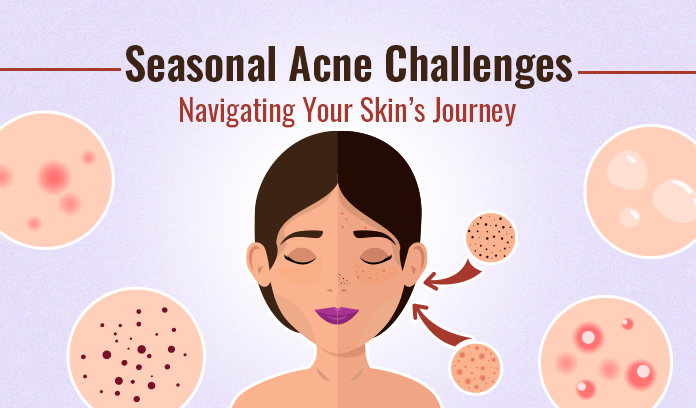Seasonal acne, a phenomenon many of us experience but rarely discuss, is the unwelcome guest that arrives with every change in weather.
The impact of seasonal shifts on our skin can be profound, leading to breakouts, dryness, or increased oiliness.
In this article, we will explore the intricacies of seasonal acne, offering insights into why it occurs and practical tips for managing it effectively.
Understanding Seasonal Changes
How Weather Affects Skin
Our skin, being the body’s largest organ, responds dynamically to changes in temperature and humidity. Understanding how these variations influence skin health is vital for combating seasonal acne.
Seasonal Variations In Hormones
Beyond environmental factors, hormonal changes play a significant role in seasonal acne. Fluctuations in hormones can trigger excess oil production, leading to clogged pores and breakouts.
Winter Acne Woes
Dry Skin and Acne
Winter brings with it harsh winds and low humidity, contributing to dry skin. Paradoxically, dry skin can stimulate the production of excess oil, creating an ideal environment for acne.
Indoor Heating and Its Impact
While indoor heating provides warmth, it can strip the air of moisture, exacerbating skin dryness. The combination of indoor heating and cold outdoor air can be a recipe for acne.
Tips For Winter Skincare
To combat winter acne, it’s essential to moisturize adequately, use a gentle cleanser, and incorporate hydrating masks into your routine.
A consistent winter skincare routine helps replenish dehydrated skin.
Springtime Skin Struggles
Allergies and Acne
Spring allergies can worsen acne symptoms. The body’s response to allergens can trigger inflammation, leading to breakouts for individuals with acne-prone skin.
Changing Pollen Levels
As pollen levels rise, they can settle on the skin, potentially clogging pores. Adjusting your skincare routine to combat this seasonal challenge is crucial.
Adjusting Skincare Routine
Spring is the perfect time to transition to lighter skincare products, focusing on those that offer hydration without causing excessive oiliness.
Summer and Sunscreen Challenges
Sunscreen and Breakouts
While sunscreen is crucial for protecting the skin from harmful UV rays, some formulations may contribute to acne. Choosing the right sunscreen is key to maintaining clear skin.
Humidity and Excess Oil [Summer Acne]
Summer’s humidity can lead to increased oil production, potentially causing breakouts. Balancing hydration without clogging pores becomes essential.
Choosing the Right Sunscreen
To prevent summer acne, opt for non-comedogenic sunscreens with a gel-based formula to shield your skin.
Fall Adjustments For Clear Skin
Transitioning Skincare Products
As temperatures drop, adjusting skincare products to address changing needs is essential. Hydration remains crucial, but heavier moisturizers may be more suitable.
Combatting Post-Summer Breakouts
While summer acne is an all too common occurrence, post-summer breakouts are not uncommon. Gently exfoliating the skin and maintaining a consistent routine can help prevent and manage acne.
Nourishing the Skin
Fall is an ideal time to nourish the skin with antioxidants and vitamins, promoting overall skin health.
Lifestyle Factors
Stress and its link to acne
Stress, a constant companion in our lives, can significantly impact skin health. Finding stress-reducing activities can help manage acne.
Seasonal changes and sleep
Quality sleep is essential for skin regeneration. Seasonal changes can disrupt sleep patterns, emphasizing the need for consistent sleep hygiene.
Seasonal acne challenges arise when the skin isn’t yet ready to acclimate to sudden changes in the weather.
FAQs
-
Are seasonal acne challenges common, or do they affect only a specific group of people?
Seasonal acne is a widespread issue that can impact individuals of all ages and skin types. While some may experience more pronounced changes with the seasons, many people notice shifts in their skin health during different times of the year.
-
How can I differentiate between regular breakouts and acne triggered by seasonal changes?
If you notice a pattern of increased breakouts during particular seasons, coupled with changes in weather or lifestyle, it’s likely related to seasonal factors.
Consulting with a dermatologist can provide an accurate diagnosis.
-
Can stress impact my skin, and how can I manage stress-related acne during different seasons?
Stress’ impact can be more pronounced during seasonal changes. Engaging in stress-reducing activities, such as meditation, exercise, or hobbies, can help manage stress-related acne. Consistent skincare habits and a healthy lifestyle also play crucial roles.
-
Are there specific foods that worsen seasonal acne, and are there dietary recommendations for clearer skin?
Dairy and high-sugar foods are often linked to breakouts. On the other hand, incorporating antioxidant-rich foods, such as fruits and vegetables, and omega-3 fatty acids can contribute to clearer-looking skin.











